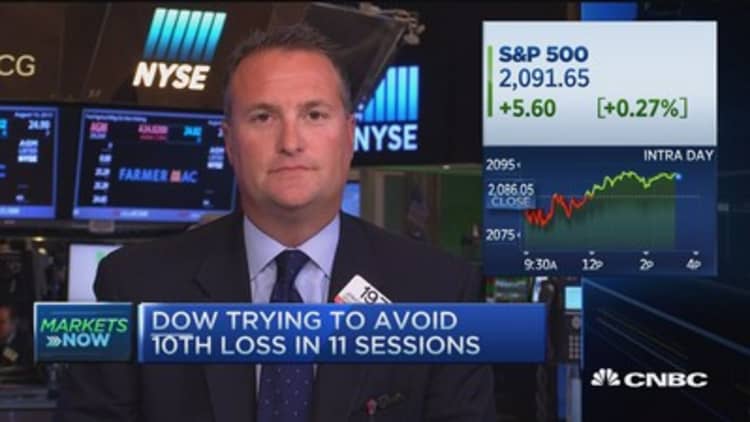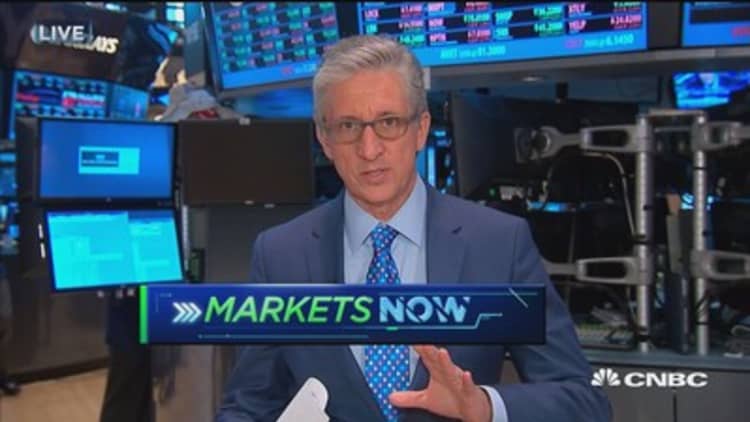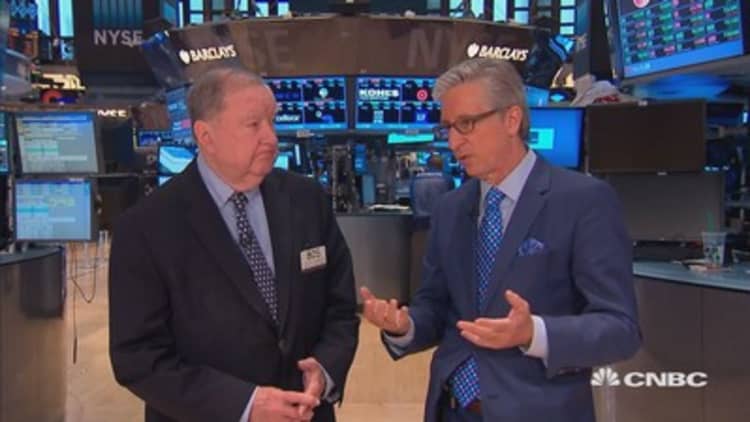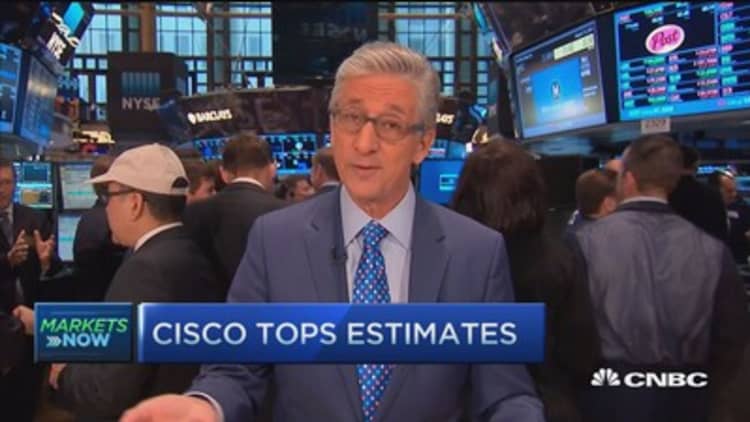



U.S. equities pared gains and closed mostly lower on Thursday despite concerns over China having been largely subsided while investors digested a number of economic data points. (Tweet This)
"We're still trading in this sort of range," said JJ Kinahan, chief strategist at TD Ameritrade. "Yesterday was such an amazing rally that it's hard to believe we come out of it unscathed."
U.S. stocks gave back most of their gains less than an hour ahead of the close after trading in a back-and-forth range throughout the morning despite a massive fall in oil prices. The Dow rose about 80 points at its peak, while the S&P 500 and the Nasdaq Composite rose about 7 points and 27 at their respective highs.
U.S. crude traded below $42 per barrel for the first time since March 2009, leading the energy sector to trade as low as 1.35 percent. WTI futures settled down 2.5 percent.
Read More Got dividends? The 5 stocks yielding more than 6%
"The negative effect of falling oil prices on stocks maybe has faded," said Zachary Karabell, head of global strategy at Envestnet.
Subdued concerns over China devaluing its currency by 10 percent propped U.S. markets higher, said William Lynch, director of investments at Hinsdale Associates. "I think that's in the rear-view mirror now," he said.
"The last thing they want is spiraling devaluation, but at the same time they are standing by their word," PBoC vice governor Yi Gang said.
On Wednesday, U.S. equities whipsawed, dropping more than 1 percent at their lows before closing mostly higher. Stocks were largely weighed down by the People's Bank of China's decision to further weaken the yuan against the U.S. dollar.
Read More Samsung launches 2 big screen devices to rival iPhone
Investors also digested a slew of economic data, as U.S. retail sales for July rose 0.6 percent, slightly above estimates, the Commerce Department said, boosted by auto sales. June's retail sales were also revised up to show them unchanged instead of the previously reported 0.3 percent drop, Reuters said.
"When you take out auto sales, it really wasn't [an increase]," said Maris Ogg, president at Tower Bridge Advisors. "We've had money coming into our pockets due to [lower] gasoline prices and we haven't spent it."
Ogg added the U.S. consumer has become more prudent since the recession and is only buying what he or she truly needs.
Read More Oil stocks have done something extraordinary: Trader
Weekly jobless claims came in at 274,000, slightly above a consensus estimate of 270,000, while import prices fell 0.9 percent amid lower oil costs and a strong dollar.
"Bottom line, the song remains the same as the pace of firing's remain quiescent as employers hold tight to their qualified workers," Peter Boockvar, chief market analyst at The Lindsey Group said in a note about the jobless claims number.
U.S. business inventories rose 0.8 percent in June, well above the estimated 0.3 percent rise.
Weekly natural gas inventories also rose by 65 billion cubic feet, the Energy Information Administration said.
Read MoreWhy US stocks shrugged off yuan devaluation: Analysts
This combination of data sets and current market conditions could in fact lead the Federal Reserve to normalize monetary policy, said Mark Luschini, chief investment strategist at Janney Montgomery Scott.
"They seem eager to get on with it ... and that's got the market on edge," Luschini said.
In Europe, stocks closed higher as investors kept an eye on the latest developments in China and the progress being made on Greece's new bailout program.
In corporate news, retailer Kohl's reported quarterly results that missed Wall Street's expectations, citing a delay in tax-free sales by a number of states.
Read MoreEarly movers: MNST, S, KO, XOM, VZ & more
Elon Musk's Tesla Motors filed to offer 2.1 million common shares in an attempt to raise at least $500 million in new capital. The company's stock traded higher before the bell.
Merck, Monster Beverage, GoPro and Yahoo shares were all upgraded by BMO Capital Markets, Morgan Stanley, Cowen & Co. and Bernstein, respectively.
Major U.S. Indexes
The Dow Jones Industrial Average closed down 5.81 points, or 0.03 percent, at 17,408, with Cisco Systems leading advancers and Intel and Caterpillar the greatest laggards. The blue chip index also snapped a two-day losing streak.
The ended down 2.66 points, or 0.13 percent at 2,083 with energy leading eight sectors lower and consumer discretionary and financials the only advancers.
The Nasdaq closed down 10.83 points or 0.21 percent.
The U.S. 10-year yield was last up 6 basis points at about 2.19 percent.
Gold futures settled down 0.9 percent at $1,114.56 an ounce.
Decliners led advancers three to two at the new York Stock Exchange, with an exchange volume of 767.30 million and a composite volume of 3.914 billion at the close.
The CBOE Volatility Index (VIX),widely considered the best gauge of fear in the market, traded near 13.
On tap this week:
Thursday
Earnings: Nordstrom, El Pollo Loco, King Digital, Party City
1 p.m.: $16 billion 30-year bonds auction
4:30 p.m.: Fed balance sheet
Friday
8:30 a.m.: PPI
9:15 a.m.: Industrial production
10 a.m.: Consumer sentiment
More From CNBC.com:


